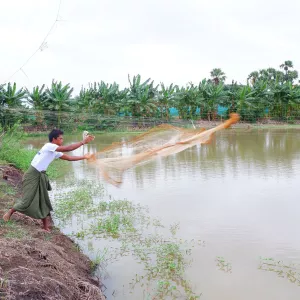Ponds of prosperity: Sustained interventions boost aquaculture and nutrition security in Myanmar
Sustained interventions to promote best management practices (BMPs) and improve nutrition have shown promising results among small-scale aquaculture producers in Myanmar, according to a new study from the CGIAR Initiative on Aquatic Foods. Small-scale aquaculture is critical to food security in Myanmar and, as one of the fastest-growing agri-food sectors in the world, it has great potential to support rural

Ponds of prosperity: Sustained interventions boost aquaculture and nutrition security in Myanmar
Sustained interventions to promote best management practices (BMPs) and improve nutrition have shown promising results among small-scale aquaculture producers in Myanmar, according to a new study from the CGIAR Initiative on Aquatic Foods.
Small-scale aquaculture is critical to food security in Myanmar and, as one of the fastest-growing agri-food sectors in the world, it has great potential to support rural development in the country and elsewhere. But small-scale fish farmers often have limited access to the technologies and information that could help improve production, earnings, and household nutrition.
The study looked at whether interventions to support BMPs in aquaculture – such as the use of the most appropriate fish species and production sites – together with the provision of nutrition training had improved pond productivity, livelihoods and food security for small-scale fish farmers in the country’s Sagaing and Shan regions.
Focusing on 379 producers involved in the Myanmar Sustainable Aquaculture Programme (MYSAP Island) intervention – implemented by WorldFish, with support from the German Development Corporation (GIZ) – it considered seven variables: fish yield, fish revenue, revenue per acre, household income, weekly fish consumption, and dietary diversity. Crucially, researchers also looked at whether the length of the BMP interventions and nutrition training was important.
They found significantly higher dietary diversity – a reflection of improved food security – in those producers who adopted BMPs and received nutrition-related training. Notably, they also found significant improvements in almost all of the variables if producers were exposed to BMPs and nutrition-sensitive training for two years, compared to those who received only one year of exposure and control groups that received none. The researchers state that this is likely to be the combined result of continual practice (learning-by-doing) and learning from others, with access to support from extension services, which help to build farmers’ skills and confidence over time. The researchers suggest that farmers being organized into producer groups also helped, since it promoted a collaborative and mutual learning environment.
“Our research clearly shows that the adoption and proper implementation of small-scale aquaculture BMPs, combined with nutrition training, has enormous potential to boost rural livelihoods in Myanmar,” said authors Dompreh Eric Brako (Postdoctoral fellow, WorldFish) Cristiano Rossignoli (co-lead, Aquatic Foods Initiative) of the study published in Food Security “But in order to make the most of the opportunity, producers need ongoing support to ensure the boost to pond productivity, incomes and household nutrition is sustained.”
According to the researchers, this would require an environment that facilitates producers’ access to high-quality inputs (such as fish seed and feed) and information, underpinned by effective and continuous extension services. In Myanmar, where extension services are extremely limited in major aquaculture hubs, they suggest this might be achieved via collaboration between public and private sector institutions (including NGOs) for extension service delivery, along with efforts to strengthen bonds between small-scale aquaculture producers through farmer-led organizations.

